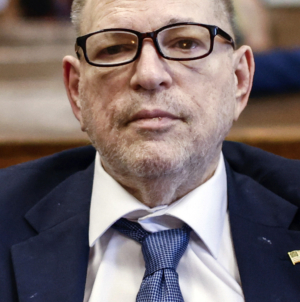-
Vivian Jenna Wilson, Elon Musk’s Transgender Daughter, Says He Was ‘Cruel’ and ‘Uncaring’ - 12 mins ago
-
How to Watch Men’s Basketball at the 2024 Paris Olympics: Streams, Schedule - 38 mins ago
-
Trump, Honing Attacks on Harris, Casts Her as a Far-Left Threat - 56 mins ago
-
Woman Explains Why She Decided To Have Rescue Dog Euthanized Over Behavior - about 1 hour ago
-
Justice Dept. Defends TikTok Law That Forces App’s Sale or Ban - 2 hours ago
-
Archaeologists Find Ancient Egyptian Artworks Hidden Below Nile Waters - 2 hours ago
-
Trump Warns of Vote Rigging, Asks Christians to Vote ‘Just This Time’ - 2 hours ago
-
Léon Marchand: The French Swimmer Who Is Carrying His Country on His Back - 2 hours ago
-
L.A. neighborhood hit by burglars for at least the third time in July - 3 hours ago
-
Harrison Butker’s Comments on Olympics Opening Ceremony Goes Viral - 3 hours ago
Ancient Wisdom for Big Tech Skeptics
As an ex-Google engineer, perhaps I should be spreading the gospel of tech, preaching about how Silicon Valley will revolutionize everything and “make the world a better place.” Instead, I come bearing more ancient wisdom: there is nothing new under the sun.
In an earlier era, the potential of the internet was seemingly boundless. In 2011, Wael Ghonim, a former Google executive and a prominent activist during the Arab Spring, famously said, “If you want to liberate a society, all you need is the Internet.” Back then, experts believed social media would be a force for good that would spread democracy throughout the Middle East. (Perhaps the Big Tech CEOs would even be greeted as liberators.) Years later, that promise had faded into darkness.
Since 2011, Facebook played a role in the genocide of the Rohingya in Myanmar. And during a Senate hearing on online child safety, Sen. Josh Hawley (R-Mo.) forced Mark Zuckerberg to apologize to parents whose children committed suicide or were exploited thanks to Instagram. Instagram, however, pales in comparison to TikTok—which is literally controlled by a communist regime in China.
This crisis has spawned many legislative proposals, including one that forces China to divest TikTok under the threat of a ban, the Kids Online Safety Act, and numerous age verification bills at the state level. Every time a new bill appears, though, an army of critics—armed with talking points from 2011—will argue that it violates the First Amendment. Often, they will cite Reno v. ACLU (1997), which struck down a law that regulated indecent content online to protect kids.
But what if Reno isn’t the only relevant Supreme Court case? In a world where nothing is new under the sun, we should also examine First Amendment cases for older media—such as cable TV.
Before cable, Americans watched TV via broadcast (i.e., an antenna); channels included the local ABC, NBC, and CBS stations. While cable offered many more channels than broadcast, cable companies also had a strong incentive to not carry local broadcast channels—even when consumers wanted those channels—as cable competed with broadcast for advertising revenue.
Fights over advertising revenue? Anticompetitive actions that increase profits but hurt consumers? That sounds a lot like what Big Tech is doing today.

Alex Wong/Getty Images
When cable companies started dropping broadcast channels, then-FCC commissioner James Quello warned Congress that the practice was just “tip of the iceberg.” Congress responded by enacting must-carry rules, forcing cable companies to carry local broadcast channels. In two cases, both named Turner Broadcasting System v. FCC, TBS and others argued that this law violated the First Amendment.
The Supreme Court upheld must-carry, first ruling that such a requirement is content-neutral and only subject to intermediate scrutiny (Turner I in 1994), and then ruling it survives intermediate scrutiny (Turner II in 1997). By contrast, in Reno, the Supreme Court overturned a law that was content-based. Content-based laws are subject to strict scrutiny—often described as “strict in theory, fatal in practice.”
Critics have always assumed that modern-day laws for social media would be unconstitutional under Reno, but what if they are instead constitutional under Turner?
After all, the TikTok bill is content-neutral, as it targets social media platforms based on foreign ownership, not based on the contents of that platform. The Kids Online Safety Act is likely content-neutral. An age verification law for social media, if drafted properly, would be content-neutral.
Age verification for porn is an exception. It belongs in a special category thanks to Ginsberg v. New York (1968), which grants legislatures more leeway when protecting kids from sexual content. This case played a key role in the Fifth Circuit’s decision to uphold Texas’ age verification law for porn sites.
For both cable and social media, the questions of law are still the same: whether the law is content-neutral, and if so, whether it survives intermediate scrutiny. The facts that the courts evaluate would be different for social media, but the core legal questions would not change. There is nothing new under the sun.
Of course, even if a law should be content-neutral in theory, lawmakers will still need to sweat the details to ensure it is content-neutral in practice. Age verification laws in Ohio and Arkansas—both blocked by the courts—serve as a cautionary tale of what happens when you don’t do that. If lawmakers do sweat the details, though, they should not be afraid of the “experts” who will inevitably argue that their legislation is unconstitutional.
Mike Wacker is a software engineer and technologist who has previously served as tech fellow in Congress.
The views expressed in this article are the writer’s own.
Uncommon Knowledge
Newsweek is committed to challenging conventional wisdom and finding connections in the search for common ground.
Newsweek is committed to challenging conventional wisdom and finding connections in the search for common ground.
Source link


















